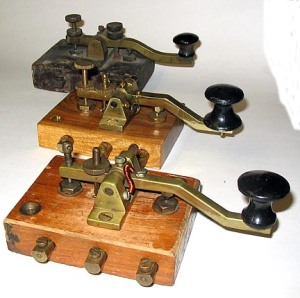Today when I read in the Times of India about the impending demise of 160 year old telegram in India, I thought that a memorial service is in order. According to the report, Bharat Sanchar Nigam Limited will discontinue its telegraph services shortly. The last telegram will be sent on 15th July 2013. One more addition to what tomorrow’s students have to study as it becomes part of history.
Indian Telecommunication industry which is today touted to be one of the fastest growing one (second only to China, of course) began with the pioneering and experimental electric telegraph between Calcutta, the then capital of India, and Diamond Harbour. Subsequently the East India Company popularised it throughout the nation. The vastness of the country necessitated a separate department which came into being in 1854. One unforgettable name in this development is that of Dr. William O’Shaughnessy.
The Dot Dash Machine! It’s becoming history!!
I remember that any telegram that was served was actually received with a lot of anxiety and trembling, so much so that in many cases receiving a telegram was synonymous with receiving bad news – death, accident, illness and so on – unless the circumstances were otherwise. The weddings of my aunts and uncles saw us receiving so many telegrams with messages. There used to be a code for the telegrams booked and conveyed at the sender’s end – “phone-o-grams” as these messages were called in those days. 4 was for “A Happy New Year to You”; 8 – “Best Wishes for a long and Happy Married Life”; 10 –“Congratulations on your Success in the Examination”; 23 -“Best Wishes for your Success in the Examination”; 100 – “Our Deepest Condolence” and so on. It had messages for every possible occasion – festivals like Diwali, Id, Guru Parb, Navroze, Onam, Christmas, occasions like new arrival (of a baby), birthday, housewarming, successes of all kinds, superannuation, pleasant and safe journey, national celebrations like Independence and Republic days, and speedy recovery from an illness / after an accident. There was even one for the Thread ceremony!!
Even for my wedding in 1983, I remember getting only telegrams for best wishes from those near and dear ones who could not attend the function. Those days Archies, Hallmark and Paper Rose and the like were hardly around in India – and definitely not in Palakkad! I remember my grandfather and my Dad going through each one of telegrams carefully and making note of all the names who had sent in the greetings. The unwritten rule was that we have to reciprocate when there was an occasion in the sender’s family.
Another occasion when I received a telegram was when Tata Tea informed me of the interview at Munnar. I had applied for the post of a teacher at their High Range School, Mattupatti, Munnar. Once the interview was over, they asked me to come over once again for a medical check up, again via telegram. (Appointments would be offered only if the medical tests were okay.) I remember that they communicated my selection and asked me to join as soon as possible, also vide another telegram. ![]()
Today, when I read the news item #, all these memories came into me. With the advent of super fast communication strategies at the wink of an eye, the click of a mouse or the touch on a touch screen, via mobile phones (Indian mobile subscriber numbers will touch 1.200 billion in 2013 according to projections!), SMSs, instant messages and emails, it is only but natural that time consuming strategies will die a sad death. The ‘dots and dashes’ of the Morse code is now on the verge of the hearing its own death knell raised by the latest gadgets courtesy a population of techno savvy digital natives, immigrants and refugees.
International Morse Code
Yet, one cannot feel sad about the passing away good old times. Information was slow to reach but life was so simple and uncomplicated. Life was full of trials and yet, everyone looked at it with hope and faith. Joys were many and sorrows were shared. Living conditions were great with fresh farm produced food, clean and clear water and lots of fresh air in our rustic countryside of Pallavur. Climate changes rarely were noticed. No preservatives. No GM or Instant food. No non stop channel discussions and live coverages. Most importantly, the Idiot Box with many of its irrational, melodramatic and silly soap operas was just not there. In short, there was nothing to pollute and sully either one’s physical or the inner being.
Alas! Those are bygone days now. And since I feel some of you will be on the same page with me on this, I use this phone-o-gram message for the requiem:
Message 100: “Our Deepest Condolence.”
PS: You have outlived all of us by living for 160 years. And have served many many millions! Blah, talk about corporate social responsibility! So, Rest In Peace. Peace that passeth all times and climes.
Image courtesy:
The Telegraph equipment: http://bit.ly/17LdBkq
International Morse Code: http://bit.ly/17LdR2M


